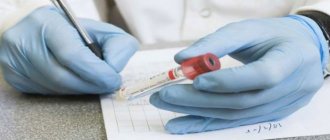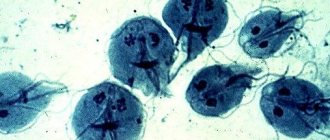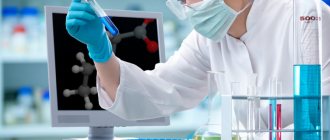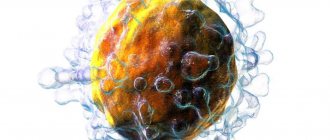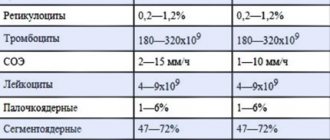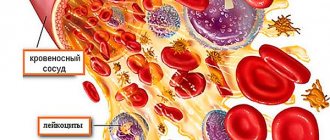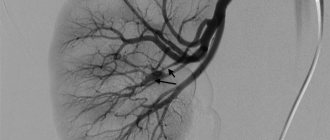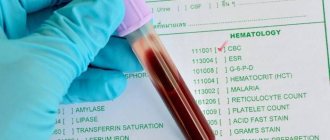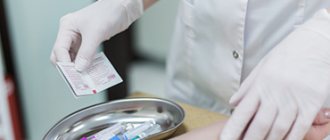- home
- Blood analysis
Immunochemical blood testing is a comprehensive examination. This diagnostic method will help you find out how protected the human body is from various infections and negative external factors. If there are malfunctions in the immune system before a person is born, then the deficiency of immunity will be of an innate nature, and if after, then this condition will be acquired.
This study is performed to assess a person's immune status. This is necessary to install:
- cell populations;
- number of immunoglobulin components of blood serum;
- circulating antigen-antibody complexes;
- the importance of leukocyte cells (phagocytes) involved in the absorption of large macromolecular complexes or corpuscles, bacterial microorganisms.
In order to conduct an immunochemical blood test, the following data must be collected:
- the proportion between the clinic and changes in immune status;
- difference between existing parameters and normal ones;
- information about the initial manifestations of the pathological process;
- data on therapeutic measures and the volume of drugs used.
Interpretation of immunochemical blood test
Immunochemical blood testing is a comprehensive examination. This diagnostic method will help you find out how protected the human body is from various infections and negative external factors. If there are malfunctions in the immune system before a person is born, then the deficiency of immunity will be of an innate nature, and if after, then this condition will be acquired.
This study is performed to assess a person's immune status. This is necessary to install:
- cell populations;
- number of immunoglobulin components of blood serum;
- circulating antigen-antibody complexes;
- the importance of leukocyte cells (phagocytes) involved in the absorption of large macromolecular complexes or corpuscles, bacterial microorganisms.
In order to conduct an immunochemical blood test, the following data must be collected:
- the proportion between the clinic and changes in immune status;
- difference between existing parameters and normal ones;
- information about the initial manifestations of the pathological process;
- data on therapeutic measures and the volume of drugs used.
Alloimmune antibodies
These are specific antibodies that appear in the body to red blood cell antigens. Their production can be caused by Rh-conflict pregnancy or blood transfusion. It is based on the recognition of the Rh factor of donor blood as foreign.
Analysis is prescribed in the following cases:
- the period of bearing a child to prevent Rh conflict;
- monitoring those pregnant women who have a negative Rh factor;
- history of miscarriage;
- development of hemolytic disease of the newborn;
- examination of the patient before blood transfusion.
The main methods of this research
When performing an immunochemical blood test, the main importance belongs to circulating immune complexes (the antigen affects the antibody). Research is used to determine:
- the root cause of the infectious process of parasitic origin;
- a quantitative indicator of hormonal compounds while a woman is pregnant;
- presence of markers;
- blood group
Immunochemistry makes it possible to identify the dilution of serum where antibodies (antibody titer) to pathogenic microorganisms are detected, and to study the characteristics of human immunity. Antigenic compounds are detected thanks to blood serum, which contains protein compounds in the blood plasma that prevent the proliferation of pathogens and suppress the toxic compounds (antibodies) they secrete. Immunological studies will help identify antibodies to a previously determined antigen.
For analysis, blood biomaterial is taken from the patient during the first day of the pathological process. The diagnosis is made after a second study two weeks later.
Immunochemical testing is often indicated for conditions if:
- Immune system defects caused by family history are suspected.
- Oncological pathology is suspected.
- A woman cannot conceive a child for a long time.
- There are autoimmune pathological processes.
general description
Immunological studies are diagnostic methods based on the specific interaction of antigens and antibodies. They are widely used for laboratory analyzes of infectious and parasitic diseases, as well as reliable determination of blood groups, hormonal imbalances, tissue and tumor antigens, recognition of allergies and autoimmune processes, protein species, as well as pregnancy.
| Blood collection for immunological research | The structure of immunoglobulin |
Indications for immunological studies
Advertising, cooperation
The site is not responsible for the content and accuracy of the content posted by users on the site, or reviews of site visitors. The materials on the site are for informational purposes only. The content of the site is not a substitute for professional medical advice, diagnosis and/or treatment. Self-medication can be dangerous to your health!
source
About the parameters of the immunochemistry study
Since an immunochemical study is a set of test analyses, the list of its constituent parameters is varied. Enzyme immunosorbent and hormonal studies are often performed, so sex hormonal compounds and different immunoglobulin classes are considered parameters. Immunoglobulins (Ig) are studied:
- A - responsible for the protective properties of the mucous membranes of the pulmonary, bronchial, renal, ureteric, bladder tissues, including the mucous tissue structures of the digestive tract. In the acute phase, this immunoglobulin is not detected. It appears from the beginning of the second week of the infectious process. In a later time period, it will indicate the chronicity of the pathological process.
- E - determines how the body reacts to allergens and infectious processes caused by parasites. But with certain infectious processes and types of allergic reactions, the indicator of this immunoglobulin remains unchanged. Additional research is needed for this.
- M - immunoglobulin element of an acute period of the pathological process. This immunoglobulin appears first in the bloodstream on the fifth day after the introduction of an infectious agent into the human body. It stays in the blood for about 1.5 months, then disappears.
- G - residual immunoglobulin, indicates the presence of resistance to any pathological process. It appears in the bloodstream approximately 30 days after the pathological process begins. It remains in the blood for many years or for the rest of your life, but does not indicate the presence of a pathological process.
- D - each person has a minimum amount. Able to show both the deficient state of immunity and the normal state of the body.
Hormones are also examined:
- Luteinizing pituitary hormonal compound. Responsible for the function of the reproductive system. The concentration of other sex hormonal compounds (progesterone, estrogen, testosterone) depends on its synthesis. In females, this hormone is responsible for the monthly cycle.
- Prolactin hormonal compound. Responsible for the process by which milk is secreted in a woman who has given birth. In huge quantities it causes inhibition of the synthesis of sex hormones.
- Estradiol hormonal compound. It exists in women and is responsible for how eggs mature, secondary sexual characteristics are expressed, and the monthly cycle occurs.
About the research and preparation itself
Blood biomaterial is collected for immunochemistry as standard. The patient's blood is taken from a venous vessel. It is examined by a special analyzing device. Therefore, the analysis data will be ready after 12-22 minutes.
Many laboratories provide such information within 1 to 2 days after the patient donates blood. For the results to be reliable, certain conditions must be met.
Blood biomaterial must be donated in the morning on an empty stomach.
In the morning, it is permissible to quench your thirst with plain water, but you should not eat food. The last meal should be no later than 10 o'clock in the evening before the study. It is also recommended to avoid foods rich in fats and proteins.
About decrypted data
The data from the immunological study is deciphered by the attending doctor. The study itself cannot be called simple; it contains various features. Independent interpretation of the study is not recommended.
It is important to know that in order to establish a diagnosis, the data of the study performed, the patient’s medical history, as well as other circumstances are taken into account.
The data is decrypted as follows:
- Immunoglobulin component A. Its normal parameter is within 15% of the total number of antibodies (immunoglobulins) in the blood. If the parameter is high, then the patient has lupus erythematosus, liver, kidney, and connective tissue pathologies. A low level is observed in cirrhosis and intoxication.
- Immunoglobulin component E. A high concentration of this immunoglobulin indicates parasitic invasion or atopic reactions due to allergies (swelling, runny nose, rashes, itchy skin).
- Immunoglobulin component M. Its indicator contains no more than 5% of the total volume of antibodies. The concentration is increased during infectious processes of various causes in the acute phase, thrush, severe liver damage, systemic lupus erythematosus.
- Prolactin hormone. In males, the normal indicator is clearer than in females, since in women the norm is associated with the monthly cycle. For a man, the norm is from 105-110 to 530-540 mIU/l. A woman has from 65-70 to 720-725 mIU/l. Under normal conditions, a woman's concentration increases during lactation. Some medications and pathological processes (tuberculosis, polycystic ovarian changes, pituitary malignant neoplasms) also affect prolactin concentration.
- Luteinizing hormone. Its concentration varies according to the monthly cycle in a woman, and in a man it is 1.14-9 mU/l. Low concentrations occur in cases of pituitary cancer, excess body weight, and absence of menstruation. High - with polycystic ovarian changes, kidney failure, endometrial proliferation, as well as in a condition where a person has been fasting for a long time.
When deciphering data, family history, the patient’s condition (monthly cycle, pregnancy, chronic pathological processes), as well as possible errors and cases in which the patient was not properly prepared, are of great importance.
This study is of great importance for the diagnosis of severe infectious processes, autoimmune pathology, intoxication conditions, various types of allergies, and problems with reproduction. Therefore, the patient is obliged to follow all the doctor’s recommendations when conducting this analysis, which will accurately determine the pathological process and effectively combat it.
source
Why is an immunochemical test (ICA) prescribed?
Immunochemical analysis is carried out to resolve the following issues:
- Determination of the relationship between the course of the disease and immune disorders.
- When indicators deviate from the norm.
- To collect data at the initial stage of the disease.
- Obtain information about therapy and the number of medications taken.
Indications for this type of diagnosis may include the following disorders:
- Frequent infections.
- Infectious diseases that occur in severe form.
- Congenital or acquired immunodeficiency.
- If a person has an autoimmune pathology.
- Presence of allergies.
- The need for surgical intervention.
- Complications after surgery.
- Anorexia.
- Various intoxications.
- Presence of tumors.
- Diabetes.
- Development of adverse reactions to medications.
Reference! While taking immunomodulators, monitoring is carried out over time in the form of an immunochemical analysis.
The resulting immunogram is deciphered by the attending physician.
What immunochromatography is is explained in the video:
Review of key indicators
Immunogram analysis primarily determines the level and indicators of immunoglobulins. The largest amount (about 75%) is occupied by immunoglobulins G. They are able to penetrate the placental barrier from the mother’s body into the fetus’s body, creating the baby’s own protective system.
If an immunological blood test shows an insufficient amount of IgG, this may indicate the presence of a malignant tumor of the lymphatic system or a developmental delay. A high level indicates liver pathology, an autoimmune or infectious disease.
IgM occupies a tenth of all other immunoglobulins. They appear at the initial stages of the disease. IgM includes rheumatoid factors and anti-infective immunoglobulins. High rates indicate the development of cirrhosis or hepatitis.
IgA makes up 15% of the total mass of immunoglobulins. They are protective factors for mucous membranes. An immunological blood test shows an increased level with the development of lupus erythematosus, rheumatoid arthritis, myeloma, and alcohol poisoning.
During the first 14 days of illness, IgA appears. Over the course of another 7 days, IgM is added to their number. By the end of the month from the onset of the disease, class A, M and G antibodies can be detected in the blood. While the patient is recovering, IgA and IgG remain in the circulatory system, but their quantitative indicators decrease by 2-4 times.
There are also IgE and IgD. These antibodies appear during allergic manifestations and helminthic infestations. In a healthy person they have low levels.
Preparation and carrying out the procedure
Blood sampling for analysis is carried out according to a standard procedure. For the analysis, you will need venous blood, which is subsequently sent to the laboratory and examined using an analyzer.
Important! Thanks to the latest medical technology, results can be seen in a matter of minutes. But many laboratories are able to provide data only after 1-2 days.
The Standardized Operating Procedure (SOP) defines how the immunochemical blood test is performed.
Antisperm antibodies
An immunogram, the price of which indicates the use of high-quality innovative diagnostic methods, allows you to assess the presence of antisperm antibodies in the blood. This method is used as an additional diagnosis of infertility in married couples.
Antibodies can be detected not only in the blood, but also in the mucus of the cervical canal, on the surface of sperm, and in the plasma of seminal fluid. Doubtful indicators are in the range of 55-60 U/ml. If such results are obtained, repeated examinations are carried out after 14 days.
Interpretation of research results: norm and pathology
Before referring a patient for a comprehensive immunochemical analysis, the doctor must collect some information about the patient so that after the study, the results can be correlated with the person’s medical history.
Additional information may include:
- Determining the relationship between the clinical picture of the disease and changes in the immune system.
- Determination of differences between indicators in the analysis and the norm.
- Collecting data about the onset of the disease.
- Information about what the patient was treated with and the amount of medications taken.
Reference! The doctor deciphers the analysis; it is worth noting that this is not a simple matter and requires special knowledge.
Below is data developed by scientists, which reflects the values of the main ICA indicators that may be acceptable, and the expected reasons for deviations from the norm:
- Immunoglobulin A – the norm is 17% of the total immunoglobulin. If the norm is exceeded, this may indicate lupus erythematosus, liver and kidney pathologies. Reduced levels occur with cirrhosis and poisoning.
- Immunoglobulin E – the norm is 0.2% of the total amount of blood immunoglobulin. When its level increases, this may indicate infection with helminths. They can manifest themselves as allergic reactions: eczema, itching, swelling, etc.
- Immunoglobulin M is a normal indicator - 5-5.2 percent of the total amount of the substance. When the indicator increases, liver pathologies, candidiasis, lupus, and infections in the acute stage are diagnosed.
- Prolactin – in men 103–535 mIU/l, in women 59–699 mIU/l. Elevated levels of this substance may indicate the presence of tuberculosis or a tumor in the pituitary gland; prolactin also increases after taking certain medications.
- Luteotropin - in men - 1.15-8.9 mU/l, in women the norm depends on the menstrual cycle. In men it causes the secretion of testosterone, in women it controls the menstrual cycle. A decrease may occur with tumors in the pituitary gland, obesity or amenorrhea, an increase with problems with kidney function, polycystic ovary syndrome, endometriosis or fasting.
In the video, the doctor talks about modern laboratory research methods:
What is colorimetry?
Analysis of the enzymatic diagnostic phase is carried out using a method called “colorimetry”. The fact is that not only the color of the material provides information about the infection, but also the color density resulting from chemical reactions. It is this indicator that determines the concentration of the pathogenic microorganism. If, in the old fashioned way, a manual diagnostic method is used, then a special calibration graph is built to determine the indicated indicators.
In modern laboratories today, the manual method is rarely used. To carry out the ELISA analysis, a special device is used - a colorimeter, in which only the research parameters are manually set, and then all the work, including plotting, is carried out automatically by the device.
Blood test price
Immunochemical blood tests can be divided into different categories, which means the price range will be different:
- A standard collection of venous blood for immunochemical testing will cost a person between 170-200 rubles.
- If you culture urine to test the sensitivity of microorganisms to antibiotics, the cost of the analysis will be more expensive, approximately 900 rubles.
Important! In some treatment centers, the collection of biomaterial is paid separately from the analysis itself.
The body's immune response and hormonal levels are extremely important. In case of any violations in this area, an immunochemical blood test is indicated.
How does the body's defense work?
Foreign agents (viruses, bacteria, fungi, chemicals and toxic substances) that enter the human body are called antigens.
The immune system reacts to their invasion by actively producing so-called antibodies - specific formations on the surface of lymphocytes aimed at binding to antigens and their further inactivation. Maturation, differentiation and formation of immune cells occur in the following organs:
- bone marrow, located in large bones;
- thymus;
- tonsils;
- The lymph nodes.
Purification of the blood from foreign agents associated with blood cells occurs in the spleen. Lymphocytes are transported throughout the body and distributed to different areas with the flow of lymph through the lymphatic vessels. This is the peripheral part of the immune system.
Immunochemical blood test
An immunochemical blood test is based on the specific binding of the compound that needs to be detected through appropriate antibodies. If a couple cannot conceive a child or is just planning one and wants to prevent problems from occurring, the gynecologist and andrologist will refer both partners for a blood test to determine hormone levels. Decoding the research results will make it possible to understand where the problem is hidden and how it can be eliminated.
Doctors are interested in reading the levels of many hormones. In each case, the list may vary depending on the health of the couple. Let's look at some hormones whose levels may interest your doctor.
Luteotropin
Luteinizing hormone or luteotropin (lutropin). Its “production” is concentrated in the anterior lobe of the pituitary gland and is carried out by gonadotropic cells. They affect the development and function of the gonads. In women, this hormone helps maintain the menstrual cycle and stimulate the production of progesterone and estrogen. In men, it is responsible for the secretion of testosterone. If the decoding of the blood test showed an increase in the level of lutropin, there is reason to assume the presence of primary dysfunction of the gonads, polycystic ovary syndrome, postmenopause, and in some cases, a pituitary adenoma.
If the level of this hormone is reduced, disturbances in the functioning of the pituitary gland and hypothalamus, the presence of Kallmann syndrome and other abnormalities in the functioning of the endocrine system are possible. The problem may also be anorexia nervosa, intestinal dysfunction, severe and prolonged stress, or taking hormonal contraceptives.
FGS (follicle-stimulating hormone) is produced by the anterior pituitary gland and is responsible for stimulating follicle growth and maintaining the menstrual cycle. In men, it stimulates sperm production. During pregnancy, FGS levels decrease sharply and may not be detected. A transcript of the blood test will show this.
If FGS is elevated, it is likely that the function of the gonads is suppressed, alcoholism, or the presence of tumors. With a reduced level of this hormone, one can assume disturbances in the functioning of the central nervous system, polycystic ovary syndrome, pregnancy, taking hormonal contraceptives, etc.
Immunodeficiency conditions
There are primary and secondary immunodeficiency states. Primary - congenital, resulting from pathology at the gene level. Secondary - acquired, which develops during life under the influence of various physical and biological factors.
There are also physiological immunodeficiencies that occur at certain stages of the body’s development:
- immunodeficiency of the newborn - due to the transition from the presence of maternal immunoglobulins in the blood to the production of their own;
- immunodeficiency of pregnant women - occurs against the background of the action of placental steroids on the activity of complements;
- senile immunodeficiency - explained by a decrease in the intensity of production of protective cells, a decrease in the phagocytic activity of neutrophils, macrophages, and the bactericidal activity of serum.
To restore the functioning of the immune system in the event of the development of pathological deficiencies, the following correction principles are used:
- Immune engineering - bone marrow, liver, thymus transplantation, administration of immunoglobulins, hemosorption, immunosorption.
- Introduction of hormones and mediators - interferon, interleukin, hormonal factors of the thymus.
- Drug treatment.
Estradiol
Free estradiol (E 3) and total estradiol (E 2) are used to monitor pregnancy. Throughout this period, the level of this hormone increases. If there is a sharp decrease in estradiol levels or its level is low, this may be a signal of a pathological condition of the fetus. The level of this hormone during prenatal diagnosis is used to check the risk of developing Down syndrome.
To make the interpretation of the blood test results as informative as possible, the level of beta-hCG (human chorionic gonadotropin) and AFP (alpha-fetoprotein) are also taken into account. If the decoding gives alarming results, they resort to alternative methods of assessing the condition of the fetus.
The simplest and most informative is ultrasound. One of the least dangerous invasive methods is amniocentesis. But it allows you to give the most detailed answer about the condition of the fetus.
Progesterone
Progesterone (P) is produced by the ovaries and adrenal cortex, and in men by the testes. It is an intermediate hormone in the synthesis of androgens. Its maximum production occurs on the 5-7th day after ovulation. If fertilization does not occur, its level decreases, and if it does occur, it increases accordingly. The main diagnostic value of determining the level of this hormone is to detect ovulation and assess the functioning of the corpus luteum.
The doctor can also write a referral for a blood test to determine the level of: testosterone (T), anti-Müllerian hormone (AMH), human chorionic gonadotropin (hCG), etc.
To confirm or refute a probable pathology, the doctor will recommend observing the hormone in dynamics; a complete decoding will help for this. To do this, you will need to take a blood test again. To decipher the indicators to be as accurate as possible, blood must be donated at the same time of day. The day of the menstrual cycle or the duration of pregnancy should also be indicated, as this affects the level of the hormone. On the eve of the test, it is important not to overwork, drink alcoholic beverages or eat fatty foods. One hour before blood sampling, you should refrain from smoking.
